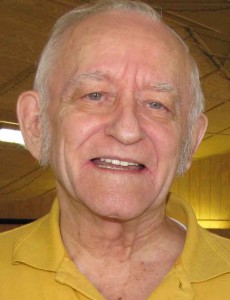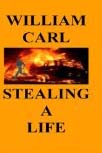Today I have novelist William Carl in for a visit. William says writing is his third career. How did you get into your “third” career.
Carl: After my retirement from Dow Chemical Company, my late wife and I sold  our house, bought a large 5th wheel trailer and truck to pull it, and took off on the road. For six years, we lived in the trailer and traveled. Things are pretty quiet in campgrounds and since my genealogical niece pestered me for my biography, I began the project. All of my writing experience was business and technical and everything I wrote sounded stiff and stodgy.
our house, bought a large 5th wheel trailer and truck to pull it, and took off on the road. For six years, we lived in the trailer and traveled. Things are pretty quiet in campgrounds and since my genealogical niece pestered me for my biography, I began the project. All of my writing experience was business and technical and everything I wrote sounded stiff and stodgy.
I bored myself with the biography to the point of thinking it needed a murder and intrigue. So, I began to fictionalize it and it eventually resulted in my first book, My Prize.
JRC: Switching from technical writing to novels is tough. I know that from personal experience. Did you have any help making this transition?
Carl: I recognized I needed some formal instruction and took three semesters of creative writing at Ozark Technical College in Springfield, Missouri.
JRC: You have three books that center around the Ranger Chemical Company. But My Prize has a different protagonist. Any special reason for that?
Carl: Bill Craig in My Prize is a vague doppelganger of my experiences. Bradley Grant in Demon In The Dark and Evil Son-Rise is a pure fiction creation. The technical areas of the two story lines don’t mesh so they can’t meld into one.
JRC: And how close do these chemists follow in the footsteps of William Carl, the chemist turned author?
Carl: Bill Craig follows more closely to my experiences: ruining experiments, discrediting of achievements, people who won’t listen and resent accomplishment. They didn’t try to kill me, but they did try to take credit for several of my inventions.
JRC: And then you have a romance novel. How did that come about?
 Carl: Daring To Love has the most unusual origin. One morning I awoke with a complete story in my head—up-to and including the last line. My sub-conscious had created the story from a situation I observed when I was a banker in Dallas. A young woman who didn’t know she was adopted fell in love with her “uncle” who was only five years older than her. She didn’t feel a real part of her family and was ignored by her social climber parents. The uncle was a management trainee at a Dallas bank and was overwhelmed by the situation. The girl was crushed when he left and fled from her family. The real story had a sad ending. I gave it a happy ending.
Carl: Daring To Love has the most unusual origin. One morning I awoke with a complete story in my head—up-to and including the last line. My sub-conscious had created the story from a situation I observed when I was a banker in Dallas. A young woman who didn’t know she was adopted fell in love with her “uncle” who was only five years older than her. She didn’t feel a real part of her family and was ignored by her social climber parents. The uncle was a management trainee at a Dallas bank and was overwhelmed by the situation. The girl was crushed when he left and fled from her family. The real story had a sad ending. I gave it a happy ending.
JRC: Tell us a little about your latest book, The Devil You Don’t See.
Carl: The Devil You Don’t See is the sequel to Until Tomorrow, my first  published novel. In both novels, I have focused the story on areas of our spiritual life. Until Tomorrow focuses on our church life, The Devil You Don’t See focuses on our community cultural life and the evil attempting to dominate us—starting with our children. Devil is the story of one battle with the devil’s demons that are around us every day.
published novel. In both novels, I have focused the story on areas of our spiritual life. Until Tomorrow focuses on our church life, The Devil You Don’t See focuses on our community cultural life and the evil attempting to dominate us—starting with our children. Devil is the story of one battle with the devil’s demons that are around us every day.
JRC: Both of these are easily classified as Christian books. Do we expect to see more in this genre?
Carl: They are profoundly Christian books and there is a third plot bubbling up. Our spiritual lives are critical to our relationship with the secular world around us. If mine is any indication, I have to say that it isn’t easy.
JRC: One of my favorites William Carl books is Stealing a Life. Will there be a sequel?
Carl: As you know, I left several details hanging and there is much to be explored. Claiming A Life is the title I have in mind for a sequel. But I’ve started three other books. Which gets finished next is a mystery.
JRC: You’ve produced eight books in a relatively short time. Any special hints or advice you’d like to pass on to our reader?
Carl: My number one hint for anyone who has a vision of being a writer is to have confidence in yourself. You have ideas that come to you every day, perhaps as a fleeting thought of “what if,” or “why don’t they” or even “when I was a kid”. Write them down immediately on a scrap of paper or in a diary or a “day book”. They will be lost if you don’t. Those thoughts are a stream of story ideas. Pour them out onto your pages.
JRC: Great advice. And an interesting interview. Thanks, Bill. You can find all of William Carl’s books on Amazon.com.

Thanks for sharing.
I always enjoy the mystery of what happens next when I write.